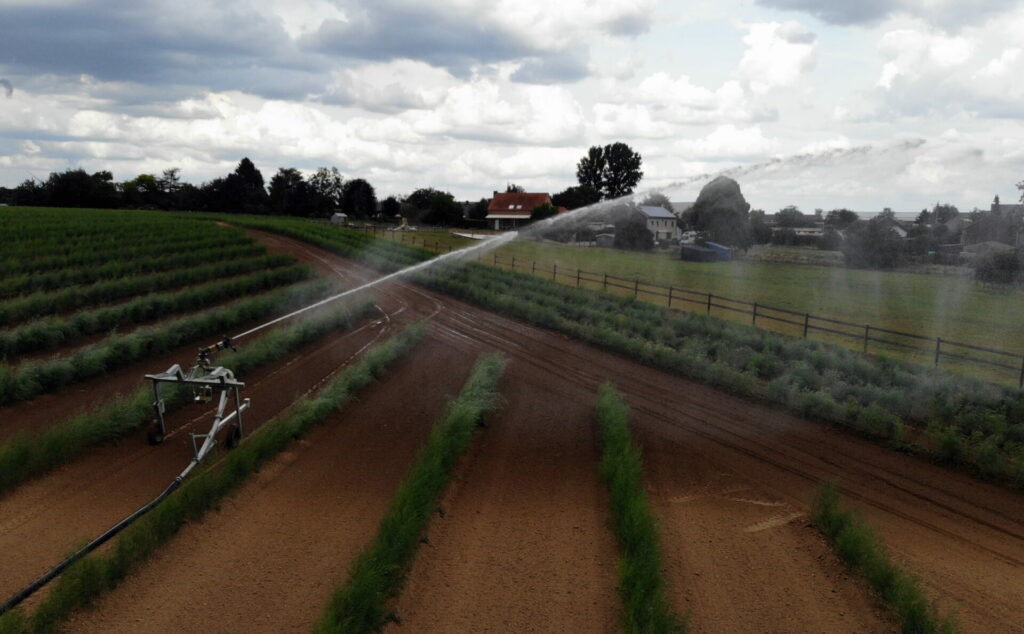As the summer continues to set new records in temperature highs, countries around the world are not only experiencing wildfires but also severe droughts. As water becomes scarcer and therefore more valuable, Belgian financial experts Alex Martens and Erik Joly are advocating investors to look into the new "blue gold."
Five northern Italian regions have issued a state of emergency as rivers run dry, severe fires in the south of France, Spain and Portugal have raged out of control across tinderbox forests and historically low levels of water have been recorded in the Great Salt Lake in the US state of Utah; these are all signs that areas of the world are facing severe droughts as the climate emergency deepens.
In Flanders, too, water usage bans have been put in place in the provinces of Antwerp, and East and West Flanders.
Droughts — and other extreme weather phenomena — can be expected to occur more and more often in the coming years, according to climatologists. Nations will have to adapt, as will utility suppliers. International companies in the water sector are already doing their best to find solutions, a situation which has prompted some financial experts to recommend investing in shares of these companies.
The extent of the industry
A "water company," in itself, is quite a broad concept, but Martens said they can roughly be divided into three categories — water infrastructure (dams and pipes), water treatment and water production and distribution.
Both Martens and Joly said it is a smart move to invest in one of these. Both experts have predominantly the same arguments to reinforce that answer. Though 70% of Earth is made up of water, only 1% is available for human consumption, which makes it scarce. Moreover, the demand for water is rising, both economists said.
"That's because there are more and more of us, but also because people's standard of living is increasing," Martens said. "In general, economic growth also means more demand for water because you often need water in industrial processes."
Related News
- Almost half of Europe at risk of drought
- Extra drought measures in Flanders ahead of temperatures rising to 37°C next week
- European Green Deal: How to restore Europe’s nature and fight climate change
Due to climate change, it is also important to have a water buffer for periods of drought or a place to divert and store water during heavy rainfall, he added. Good water management is therefore of great importance and requires investments. Various, especially international, companies are responding to this and are making great profits with their innovations.
"This year, nothing is booming on the stock markets, but in recent years water has certainly been a popular investment theme," Martens said. "For me, water is really a timeless growth story."

A thermometer nearing 40 degrees during the heath wave in Brussels on Tuesday 19 July. Credit: Hatim Kaghat / Belga
Though water funds have been around for at least 20 years, investments are now growing because of the drought, Joly agreed.
"The last real hype we saw in investments was in November last year. At that time, a lot of funds came out that were involved in the energy transition," Joly said. "I think water is more of an established value in a diversified portfolio."
Not without risk
As with any investment, of course, there are risks, the economists said. Having a diversified portfolio is important, Joly emphasises.
"Water is a good investment from a long-term perspective, but always part of a well-diversified portfolio," he said. "By
that I mean that you also buy shares of companies in other sectors, such as the pharmaceutical, industrial or financial sectors."
The water sector is also not separate from the economy, which should also be taken into consideration before taking the plunge. It is not overly speculative but also not immune to the general stock market corrections, like a rise in interest rates. This impact is not the same for all water companies, Martens said.
"The water infrastructure companies are more cyclical. That is, they go along with the economy," he said. "If the economy is doing well, more will be built, and those companies can benefit from it. But if things go badly and savings are made, that's a segment that doesn't do as well. Companies in water treatment have structural growth, whether the economy is doing well or not, that is something that always has to happen."
Where to begin
Investing in water funds early on gives one the chance to have a larger spread of the water companies you invest in. Joly said it is always best to consult your bank before investing where questions about water funds can be answered.
"A next step could then be that you dive into the product sheet based on that information. There is usually a top 10 of the largest companies that are in that fund," he said. "You can always choose to buy certain shares directly from them, but by acting in this way, you will of course be less diversified."
Both economists agree that investing is never without risk and spreading shares across different sectors is the rule of thumb if you want to limit your risks, even when it comes to water.

